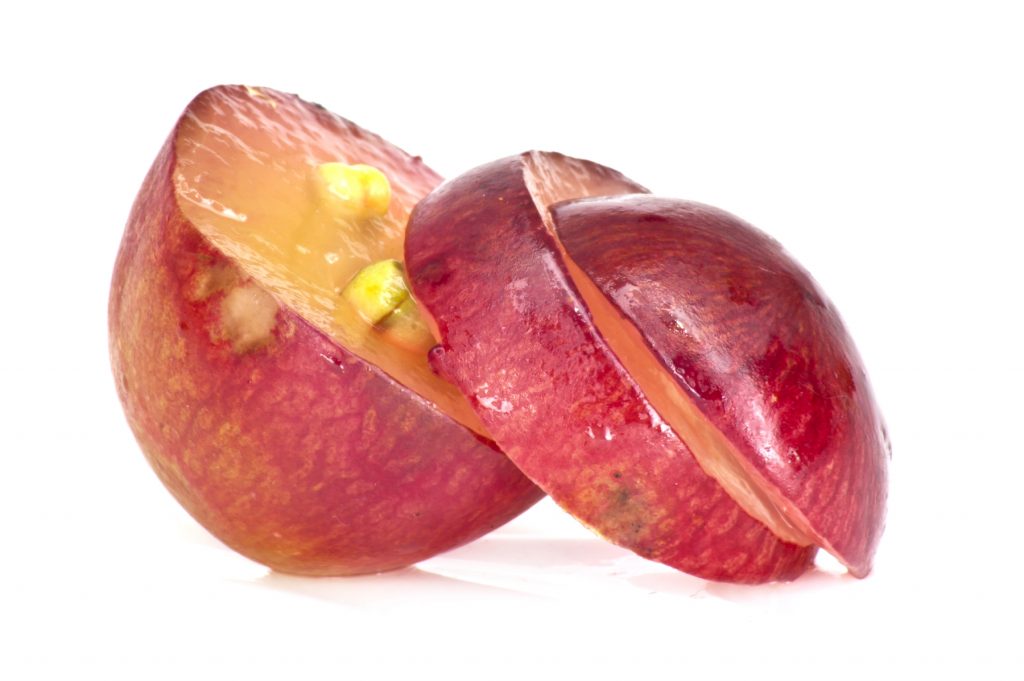
Grape seeds contain high levels of procyanidin B dimers that act as both anti-oxidants and aromatase inhibitors (which suppress estrogen production and inhibit growth of estrogen dependent breast cancer). Grape seed extract treatment of breast cancer cells causes down-regulation of two transcription factors, cyclic AMP-responsive element binding protein-1 (CREB-1) (which binds to certain genes and turns them on or off) and glucocorticoid receptor (GR). These two factors together would normally cause increased aromatase gene expression, and therefore increased estrogen production.
Treatment of breast cancer cells with grape seed extract strongly inhibits mitogen-activated protein kinase (MAPK) (which regulates cell proliferation and cell differentiation) and extracellular signal-regulated protein kinase1/2 molecules (which regulate cell division and are affected by growth factors, cytokines, virus infection and carcinogens) and MAPK/p38 (which regulates cell death) in a dose-dependent manner. Grape seed extract also induces cyclin-dependent kinase inhibitor Cip1/p21 (a gene which regulates cell cycle progression at G1. The expression of this gene is tightly controlled by the tumor suppressor protein p53) and decreases cyclin-dependent kinase 4 (which regulates cell division in the G1-S phase).
Cells treated with grape seed extract accumulate in the G1 phase of the cell cycle in a dose-dependent manner and cell growth is inhibited irreversibly, although cells do not undergo apoptosis. Rather, differentiation (normalization) occurs, as evidenced by an increase in cytokeratin 8 protein level (a marker of differentiation).
Grape seed extract, when used with the common chemotherapy drug, Doxorubicin, exhibited a synergistic effect in inhibiting breast cancer cell growth in the G1 phase. When used with the chemotherapy drug adriamycin on MCF-7/ADR cells in mice, grape seed extract effectively reversed drug resistance, causing increased cell death than when adriamycin was used alone. In this study, grape seed extract inhibited Pgp expression, a gene product correlated with drug resistance. Grape seed extract inhibits the growth of tumor cells and increases the ratio of Bax:Bcl-2 proteins (which increases apoptosis or cell death), cytochrome c release (an intermediate protein facilitating cell death), induction of Apaf-1 (a cytoplasmic protein that initiates apoptosis) and activation of caspase 3 (which helps to execute apoptosis) in the tumor microenvironment and inhibits metastases or spread of cancer to the lungs.
Grape seed extract also inhibits angiogenesis, or formation of a blood supply to an existing breast cancer tumor (which halts its growth). Grape seed extract halts the cell cycle in the S phase and inhibits production of the gene protein, survivin (which would otherwise block apoptosis or cell death). When added to the diet of rats, grape seed extract along with genistein prevented chemically induced breast cancer. (Therefore add grape seed extract when the chemotherapy drugs doxorubicin and/or adriamycin are used; when the cancer is estrogen-receptor positive; to prevent metastases; to prevent angiogenesis; to prevent chemically-induced cancers; and to increase apoptosis or cancer cell death).
Resveratrol, an antioxidant found in grapes has high antitumor activity to breast cancer. The oral absorption of resveratrol in humans is about 75% but extensive metabolism in the intestine and liver results in an oral bioavailability considerably less than 1%. Increasing the dosage or giving it repeatedly does not increase availability.
- Suppression of estrogen biosynthesis by procyanidin dimers in red wine and grape seeds.
- Grape seed extract is an aromatase inhibitor and a suppressor of aromatase expression.
- Potential cancer-chemopreventive activities of wine stilbenoids and flavans extracted from grape (Vitis vinifera) cell cultures.
- A polyphenolic fraction from grape seeds causes irreversible growth inhibition of breast carcinoma MDA-MB468 cells by inhibiting mitogen-activated protein kinases activation and inducing G1 arrest and differentiation.
- Synergistic anti-cancer effects of grape seed extract and conventional cytotoxic agent doxorubicin against human breast carcinoma cells.
- Reversal of multidrug resistance of MCF-7/ADR in nude mice by grape seed polyphenol.
- Grape seed proanthocyanidins induce apoptosis and inhibit metastasis of highly metastatic breast carcinoma cells.
- Grape seed extract inhibits angiogenesis via suppression of the vascular endothelial growth factor receptor signaling pathway.
- Grape seed extract inhibit proliferation of breast cancer cell MCF-7 and decrease the gene expression of survivin.
- Chemoprevention by grape seed extract and genistein in carcinogen-induced mammary cancer in rats is diet dependent.
- Effects of diverse dietary phytoestrogens on cell growth, cell cycle and apoptosis in estrogen-receptor-positive breast cancer cells.
- Bioavailability of resveratrol.



